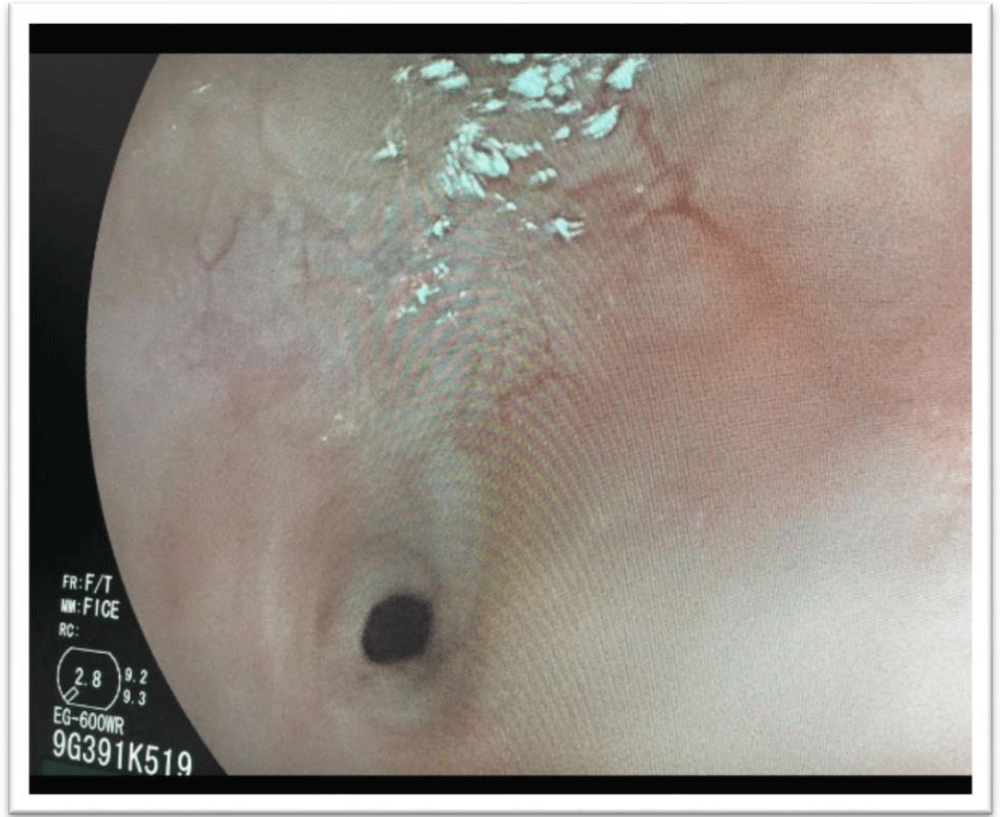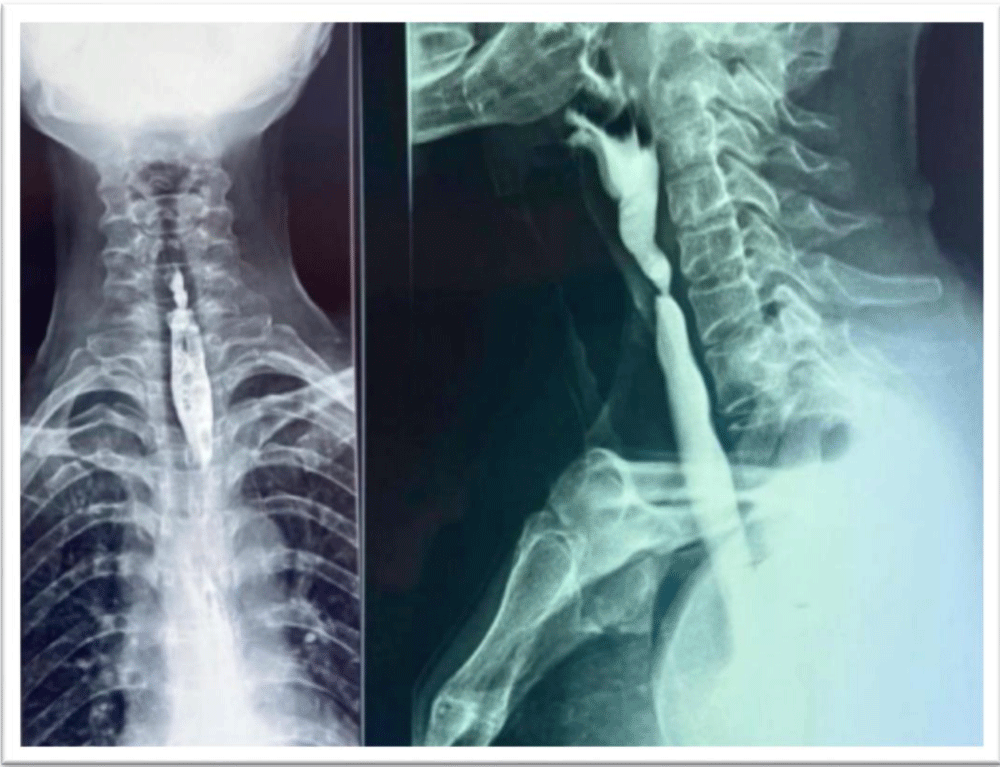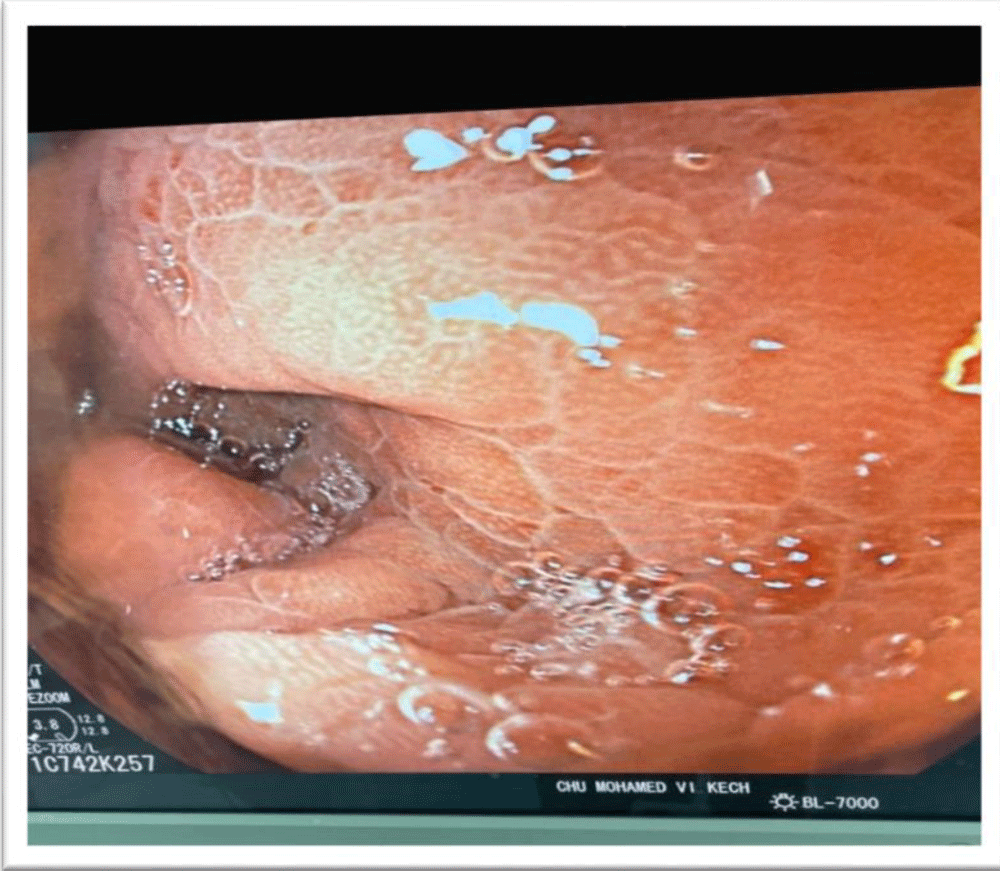Archives of Clinical Gastroenterology
Plummer-Vinson Syndrome Revealing Gastric Tumor: A Case of a Very Rare Association
1Hepato-Gastroenterology Department, University Hospital of Mohammed VI, Marrakesh, Morocco
2Physiology Laboratory, Faculty of Medicine and Pharmacy, Cadi Ayyad University, Marrakesh, Morocco
Author and article information
Cite this as
Jallouli A, Laghfiri N, Bouatmani ME, Nacir O, Lairani F, Errami AA, et al. Plummer-Vinson Syndrome Revealing Gastric Tumor: A Case of a Very Rare Association. Arch Clin Gastroenterol. 2025; 11(1): 012-014. Available from: 10.17352/2455-2283.000128
Copyright License
© 2025 Jallouli A, et al. This is an open-access article distributed under the terms of the Creative Commons Attribution License, which permits unrestricted use, distribution, and reproduction in any medium, provided the original author and source are credited.Background: Plummer-Vinson Syndrome (PVS) is a rare clinical entity defined by the triad of dysphagia, iron deficiency anemia, and esophageal webs. While commonly associated with upper aerodigestive tract malignancies, its link with gastric tumors is exceptionally rare.
Case presentation: We report a case of a 66-year-old male with PVS who was ultimately diagnosed with gastric adenocarcinoma. The patient presented with progressive solid food dysphagia, iron deficiency anemia, and significant weight loss. Endoscopic evaluation revealed a cervical esophageal web and, following dilation, an ulcerated gastric mass. Histopathological examination confirmed moderately differentiated gastric adenocarcinoma. The patient underwent total gastrectomy followed by chemotherapy with favorable early outcomes.
Discussion: This case illustrates a rare but important association between PVS and gastric cancer. Chronic iron deficiency may play a role in carcinogenesis via oxidative stress and inflammatory pathways. Literature review supports a potential pathophysiological link, though epidemiological data remains limited.
Conclusion: Clinicians should maintain a high index of suspicion for gastrointestinal malignancies in patients with PVS, particularly when symptoms are persistent or atypical. Early endoscopic evaluation and thorough investigation are warranted to exclude underlying cancer.
Plummer-Vinson Syndrome (PVS) is a rare disorder characterized by the classic triad of dysphagia, iron deficiency anemia, and esophageal web formation. While it is traditionally linked to esophageal and pharyngeal cancers, its association with gastric tumors is rarely reported, with fewer than ten cases reported in the literature to date [1]. Pathophysiological mechanisms may involve iron-mediated disruption of DNA repair, mitochondrial dysfunction, and altered cellular metabolism, oxidative stress and chronic inflammation [2,3].
This report presents a rare case of PVS associated with gastric adenocarcinoma, along with a literature review highlighting the pathophysiological mechanisms, clinical characteristics, and current therapeutic strategies.
case report
A 66-year-old male with a history of iron deficiency anemia treated with oral iron supplementation, chronic smoking (20 pack-years), and occasional alcohol consumption presented with a one-year history of intermittent solid food dysphagia, sparing liquids. He also reported poorly tolerated anemia symptoms, including significant fatigue, exertional dyspnea, brittle nails, and hair loss. He did not report other symptoms such as dysphonia or respiratory issues. He exhibited a significant decline in general health, including marked asthenia, an 18 kg weight loss, and anorexia.
Physical examination revealed a conscious patient, hemodynamically and respiratory stable, having a WHO performance status of 2 and a BMI of 17 kg/m². Generalized mucocutaneous pallor and signs of malnutrition (fat and muscle wasting) and dehydration (skin tenting, sunken eyes). Abdominal examination was unremarkable.
Biological workup revealed profound hypochromic microcytic anemia (Hb 8 g/dL), with a ferritin of 5 ng/mL. Platelet and leukocyte counts were within normal limits. The assessment also showed functional renal failure (urea 0.78 mg/L, creatinine 11 mg/L), hypokalemia (2.9 mmol/L), hypoalbuminemia (23 g/L), and deficiencies in vitamin D and calcium.
Initial esophagogastroduodenoscopy (EGD) revealed a regular cervical esophageal stricture with a web-like membranoid diaphragm that was non-passable (Figure 1). Histology revealed acanthotic squamous epithelium with parakeratosis and no dysplasia. A barium swallow confirmed a cervical esophageal membrane consistent with PVS (Figure 2).
The patient underwent EGD with progressive balloon dilation up to 12 mm. Post-dilation endoscopy revealed thickened, ulcerated gastric folds in the fundus (Figure 3). Biopsies confirmed a moderately differentiated gastric adenocarcinoma.
A thoracoabdominopelvic CT scan revealed no evidence of metastatic disease or lymph node enlargement. The gastric mass appeared confined to the gastric fundus without adjacent organ invasion. After nutritional support and multidisciplinary team discussion, the patient underwent total gastrectomy and perioperative chemotherapy. Histopathological analysis post-gastrectomy revealed a pT2N0 moderately differentiated adenocarcinoma, without lymphovascular or perineural invasion, surgical margins were free of tumor infiltration. The evolution was good with favorable clinical progress three months post-therapy.
Discussion
Plummer-Vinson syndrome, also called Paterson-Brown-Kelly syndrome, was first described in the early 20th century. It presents with upper esophageal webs causing dysphagia and is typically associated with severe iron deficiency anemia [1]. The anemia results from iron malabsorption or chronic occult blood loss. Esophageal webs typically occur in the cervical esophagus but may appear elsewhere [4].
PVS primarily affects women of reproductive age and is traditionally linked to an increased risk of oropharyngeal cancers, particularly esophageal and oral cavity malignancies [5]. However, its association with gastric tumors is scarcely reported, despite evidence suggesting a link between chronic iron deficiency anemia and gastrointestinal malignancies.
Chronic iron deficiency may contribute to gastric carcinogenesis via metabolic disruptions and oxidative stress [2]. Chronic iron deficiency is also associated with inflammation, a known precursor to carcinogenesis [3], one study showed that nutritional deficiencies and inflammation can lead to genetic mutations in gastric mucosal cells.
Several underlying biological mechanisms may explain this association. Chronic iron deficiency alters key cellular processes, including growth regulation and immune responses. Reduced iron availability may impair DNA repair mechanisms, increasing the risk of mutations and cancer development [6]. Iron deficiency also promotes the generation of reactive oxygen species, which damage the gastric mucosa and contributing to chronic inflammation, a key driver of carcinogenesis [7].
Köklü, et al. [8] reported a case involving a patient with long-standing PVS who developed gastric cancer, supporting a possible link. However, further epidemiological studies are needed to clarify this association.
The diagnosis of PVS is based on the classical clinical trial. Confirmation requires endoscopic identification of esophageal webs and laboratory evidence of iron deficiency (low ferritin, serum iron, and transferrin saturation) [9].
Treatment includes iron supplementation (oral or intravenous) and endoscopic dilation for symptomatic webs [2]. If gastric cancer is diagnosed, oncologic management, including surgical resection and chemotherapy is essential, tailored to tumor type and stage [4].
Conclusion
This case highlights a rare yet clinically significant association between Plummer-Vinson syndrome and gastric adenocarcinoma. This underscores the need for increased vigilance and thorough gastrointestinal evaluation in patients with persistent iron deficiency anemia and dysphagia. Incorporating histological, endoscopic, and imaging modalities ensures timely diagnosis and management of underlying malignancies.
Further studies are needed to explore this association and assess the risk in PVS patients. Until then, close clinical monitoring is warranted with an emphasis on early detection of gastric malignancies.
Consent to publication
The patient provided informed consent, in order to allow the production and publication of this manuscript.
- Luqman M, Akhtar S, Ramzan MA, Afzal A, Naeem SH, Yawar W. Plummer-Vinson syndrome: A case report. J Liaquat Natl Hosp Med Coll. 2023;1(2):107-110. Available from: http://dx.doi.org/10.37184/jlnh.2959-1805.1.17
- Te HS, Schiano TD, Kuan SF, Hanauer SB, Conjeevaram HS, Baker AL. Hepatic effects of long-term methotrexate use in the treatment of inflammatory bowel disease. Am J Gastroenterol. 2003;98(5):1075–1081. Available from: https://doi.org/10.1111/j.1572-0241.2000.03287.x
- Jaroenlapnopparat A, Bhatia K, Coban S. Inflammation and gastric cancer. Diseases. 2022;10(3):35. Available from: https://doi.org/10.3390/diseases10030035
- Verma S, Mukherjee S. Plummer-Vinson syndrome. In: StatPearls [Internet]. Treasure Island (FL): StatPearls Publishing; 2025 Jan-. Available from: https://www.ncbi.nlm.nih.gov/books/NBK538306/
- Faraji F, Rettig EM, Tsai H-L. Manifestations of head and neck cancer in patients with Plummer-Vinson syndrome: a systematic review. Oral Surg Oral Med Oral Pathol Oral Radiol. 2025;139(5):e1-e10.
- Zohora F, Bidad K, Pourpak Z, Moin M. Biological and immunological aspects of iron deficiency anemia in cancer development: A narrative review. Nutr Cancer. 2018;70(4):546–56. Available from: https://doi.org/10.1080/01635581.2018.1460685
- Noto JM, Gaddy JA, Lee JY, Piazuelo MB, Friedman DB, Colvin DC, et al. Iron deficiency accelerates Helicobacter pylori–induced carcinogenesis in rodents and humans. J Clin Invest. 2013;123(3):1391–401. Available from: https://doi.org/10.1172/jci64373
- Köklü S, Bulut M, Cakal B, Bozkurt A, Yüksel O. Gastric cancer presenting with Plummer-Vinson syndrome. J Am Geriatr Soc. 2009;57(5):933–4. Available from: https://doi.org/10.1111/j.1532-5415.2009.02246.x
- Goel A, Bakshi SS, Soni N, Chhavi N. Iron deficiency anemia and Plummer–Vinson syndrome: current insights. J Blood Med. 2017;8:175–84. Available from: https://doi.org/10.2147/jbm.s127801
Article Alerts
Subscribe to our articles alerts and stay tuned.
 This work is licensed under a Creative Commons Attribution 4.0 International License.
This work is licensed under a Creative Commons Attribution 4.0 International License.





 Save to Mendeley
Save to Mendeley
